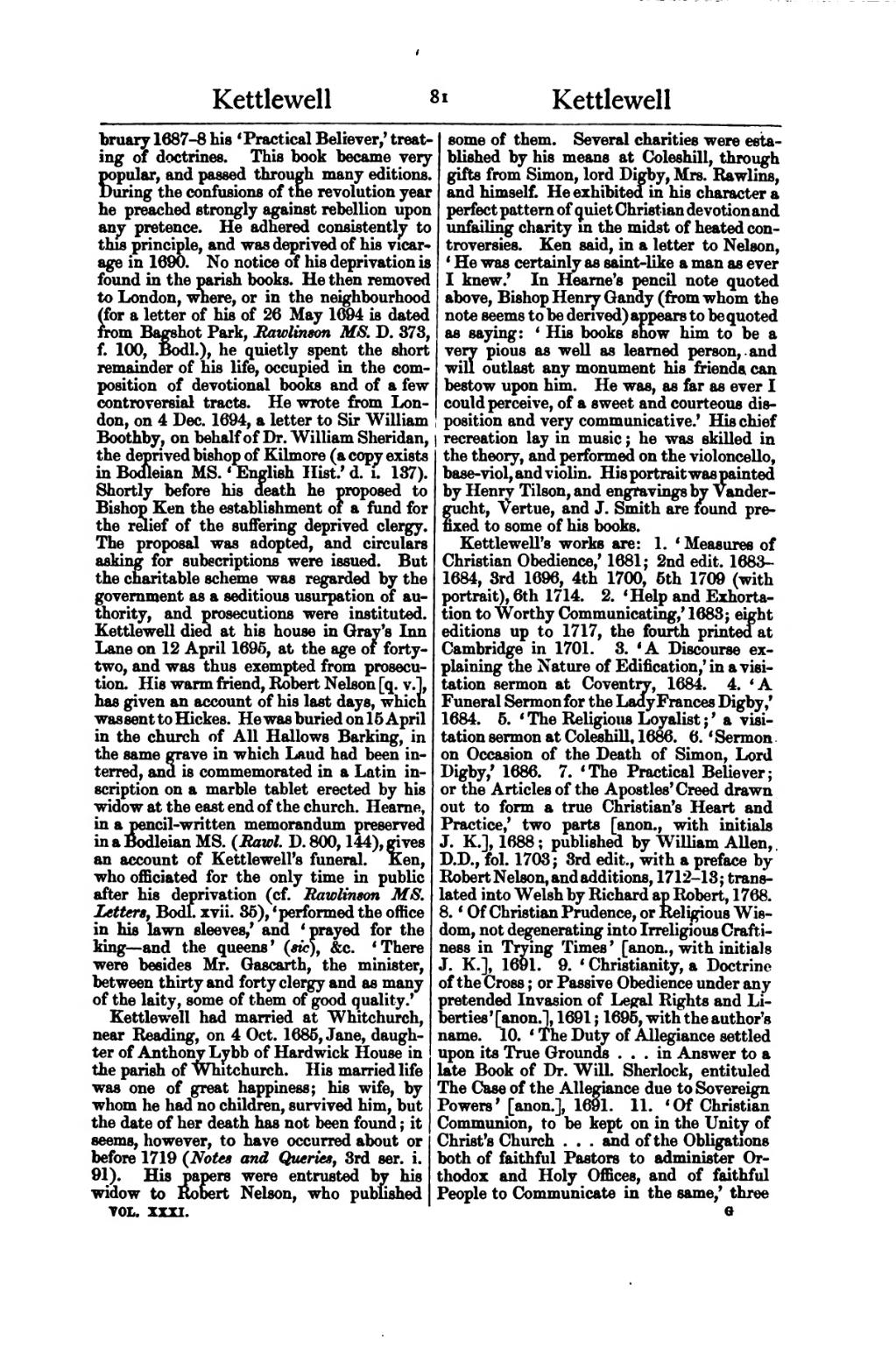bruary 1687-8 his 'Practical Believer,' treating of doctrines. This book became very popular, and passed through many editions. Through the confusions of the revolution year he preached strongly against rebellion upon any pretence. He adhered consistently to this principle, and was deprived of his vicarage in 1690. No notice of his deprivation is found in the parish books. He then removed to London, where, or in the neighbourhood (for a letter of his of 16 May 1694 is dated from Bagshot Park, Rawlinson MS. D. 373, f. 100, Bodl.), he quietly spent the short remainder of his life, occupied in the composition of devotional books and of a few controversial tracts. He wrote from London, on 4 Dec. 1694, a letter to Sir William Boothby, on behalf of Dr. William Sheridan, the deprived bishop of Kilmore (a copy exists in Bodleian MS. 'English Hist.' d. i. 137). Shortly before his death he proposed to Bishop Ken the establishment of a fund for the relief of the suffering deprived clergy. The proposal was adopted, and circulars asking for subscriptions were issued. But the charitable scheme was regarded by the government as a seditious usurpation of authority, and prosecutions were instituted. Kettlewell died at his house in Gray's Inn Lane on 12 April 1695, at the age of forty-two, and was thus exempted from prosecution. His warm friend, Robert Nelson [q. v.], has given an account of his last days, which was sent to Hickes. He was buried on 15 April in the church of All Hallows Barking, in the same grave in which Laud had been interred, and is commemorated in a Latin inscription on a marble tablet erected by his widow at the east end of the church. Hearne, in pencil-written memorandum preserved in a Bodleian MS. (Rawl. D.800, 144), gives an account of Kettlewell's funeral. Ken, who officiated for the only time in public after his deprivation (cf. Rawlinson MS. Letters, Bodl. xvii. 35), 'performed the office in his lawn sleeves,' and 'prayed for the king—and the queens' (sic), &c. 'There were besides Mr. Gascarth, the minister, between thirty and forty clergy and as many of the laity, some of them of good quality.'
Kettlewell had married at Whitchurch, near Reading, on 4 Oct. 1685, Jane, daughter of Anthony Lybb of Hardwick House in the parish of Whitchurch. His married life was one of great happiness; his wife, by whom he had no children, survived him, but the date of her death has not been found; it seems, however, to have occurred about or before 1719 (Notes and Queries, 3rd ser. i. 91). His papers were entrusted by his widow to Robert Nelson, who published some of them. Several charities were established by his means at Coleshill, through gifts from Simon, lord Digby, Mrs. Rawlins, and himself. He exhibited in his character a perfect pattern of quiet Christian devotion and unfailing charity in the midst of heated controversies. Ken said, in a letter to Nelson, 'He was certainly as saint-like a man as ever I knew.' In Hearne's pencil note quoted above, Bishop Henry Gandy (from whom the note seems to be derived) appears to be quoted as saying: 'His books show him to be a very pious as well as learned person, and will outlast any monument his friends can bestow upon him. He was, as far as ever I could perceive, of a sweet and courteous disposition and very communicative.' His chief recreation lay in music; he was skilled in the theory, and performed on the violoncello, base-viol, and violin. His portrait was painted by Henry Tilson, and engravings by Vandergucht, Vertue, and J. Smith are found prefixed to some of his books.
Kettlewell's works are: 1. 'Measures of Christian Obedience,' 1681; 2nd edit. 1683-1684, 3rd 1696, 4th 1700, 5th 1709 (with portrait), 6th 1714. 2. 'Help and Exhortation to Worthy Communicating,' 1683; eight editions up to 1717, the fourth printed at Cambridge in 1701. 3. 'A Discourse explaining the Nature of Edification,' in a visitation sermon at Coventry, 1684. 4. 'A Funeral Sermon for the Lady Frances Digby,' 1684. 5. 'The Religious Loyalist;' a visitation sermon at Coleshill. 1686. 6. 'Sermon on Occasion of the Death of Simon, Lord Digby,' 1686. 7. 'The Practical Believer; or the .Articles of the Apostles' Creed drawn out to form a true Christian's Heart and Practice,' two parts [anon., with initials J. K.], 1688; published by William Allen, D.D., fol. 1703; 3rd edit., with a preface by Robert Nelson, and additions, 1712-13; translated into Welsh by Richard ap Robert, 1708. 8. 'Of Christian Prudence, or Religious Wisdom, not degenerating into Irreligious Craftiness in Trying Times' [anon., with initials J. K.], 1691. 9. 'Christianity, a Doctrine of the Cross; or Passive Obedience under any pretended Invasion of Legal Rights and Liberties' [anon.]. 1691; 1695, with the author's name. 10. 'The Duty of Allegiance settled upon its True Grounds ... in Answer to a late Book of Dr. Will. Sherlock, entituled The Case of the Allegiance due to Sovereign Powers' [anon.], 1691. 11. 'Of Christian Communion, to be kept on in the Unity of Christ's Church . . . and of the Obligations both of faithful Pastors to administer Orthodox and Holy Offices, and of faithful People to Communicate in the same,' three
